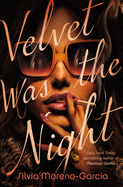Velvet Was the Night
by Silvia Moreno-Garcia
Silvia Moreno-Garcia (Mexican Gothic) opens Velvet Was the Night with an epigraph quoting a June 1971 U.S. Department of State telegram about the Hawks, a murderous Mexican government-trained "shock group" supported by the CIA. She ends with this final sentence in her afterword: "My novel is noir, pulp fiction, but it's based on a real horror story." Against the violent backdrop that provoked a brutal massacre in Mexico City, bestselling author Moreno-Garcia--born in Mexico and now living in Canada--crafts a mesmerizing mystery revealed in the alternating voices of two strangers, both in search of a missing young woman.
"He didn't like beating people," El Elvis admits. The irony of being a peace-leaning thug who prefers to learn a new word a day from his beloved Illustrated Larousse dictionary is not lost on him: "Often life doesn't make sense, and if Elvis had a motto it was that: life's a mess." Although he's only just turned 21, he's already had a live-in romance with "an American lady who they said had a thing for youngsters." She replaced him soon enough, but not before he absconded with some of her precious vinyl records. Between words and music, someday he hopes to become "an accomplished man," like his boss El Mago, but for now, he diligently follows orders. Even after two years in service to El Mago, he knows that as the youngest of the gang he has to assert himself or risk being sidelined. He's proud to be a Hawk; they're mostly still young because they need to pass as students in order to "inform on the activities of the annoying reds infesting the universities."
And then there's Maite, who's turning 30, her hair already graying: "Her body betrayed her," she's convinced. She's a disgruntled secretary in a legal office but refuses to look for another job. She's been in love once, with an older man who lured her with ice cream and movies, which quickly progressed to cheap hotels for quick sex; then he dumped her for being boring. In the decade since, most of her acquaintances have married and had kids, leaving her plenty of time to feed her obsession: the passion and betrayal she's addicted to in Secret Romance, a serial magazine she reads--usually with music playing to keep her company--with zealous devotion. Her social life is limited to uncomfortable visits with her mother and sister, both relentlessly judgmental about Maite being an old maid. And yet she daydreams about having stories of wild trysts to share with the secretary pool come Mondays.
The most excitement Maite's had recently is meeting Leonora, the art student in the apartment across the hall. Maite "knew her type: modern, free, young, the member of a new generation who didn't have to pay their respect to their fussy mothers and their irritating sisters, instead happily drinking, smoking, living it up." Late Friday night, Leonora knocks on Maite's door, asking Maite to feed her cat while she's away: "I'll be back by... well, Sunday night. Monday morning, tops," she promises. Maite might have hesitated initially, but she's already contemplating what she would steal from Leonora. Maite's neighbors regularly trust her with their animals, unaware that in every home she enters, "she took great care in choosing her loot. It was never anything extravagant, anything people would notice, but it was always something interesting."
But by Tuesday, Leonora still hasn't returned. She eventually calls, promising Maite double the money to watch kitty just a bit longer. That could be enough to pay for her car repairs, but Maite remains annoyed because now she's supposed to deliver the cat across town. Leonora, though, never shows. Meanwhile, El Mago has a new assignment for Elvis: find art student Leonora Trejo--and her camera with important photos. "And no harming her," El Mago warns. "It is strictly find-and-retrieve."
Here, finally, Elvis and Maite's narratives are poised to connect and overlap. Up until then, Moreno-Garcia showcases an enviable writerly superpower--the ability to create intimate lives with seemingly inconsequential details, all the while weaving an elaborate web riddled with holes, yes, but shrewdly poised to catch readers unawares. Her clever clues are openly strewn, but so easily overlooked as to merit re-reading to fully appreciate her intricate construction. That she also succeeds in exposing a horrific real-life event too few know about--while deftly humanizing its aftermath--is perhaps an even more substantial achievement.
Moreno-Garcia begins her narrative on June 10, 1971, both a holy day--the feast of Corpus Christi (lapsed Catholic Elvis wonders if he should go to communion after finishing El Mago's dirty work)--and what will be christened the Corpus Christi Massacre, which left hundreds of student protestors injured and dead at the hands of the Mexican and U.S. government-supported, paramilitary-trained, anti-communist Hawks. That is the horrific history onto which Moreno-Garcia layers her skillful fiction--complete with a carefully curated, inspiring playlist appended at book's end--as she imagines the days that follow. The tragic reverberations cause inevitable betrayal, decimate alliances, shatter hopes, accelerate the body count--but also, even, suggest the possibility of finding... well... maybe, love. --Terry Hong








